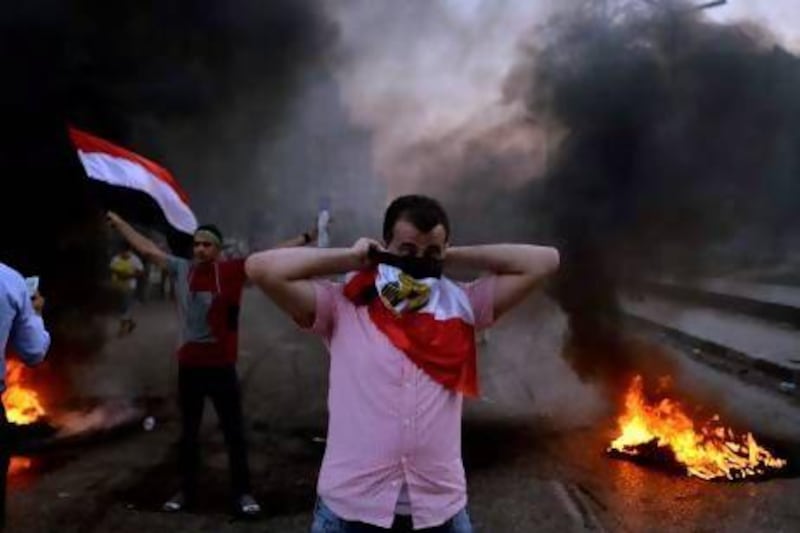CAIRO // The Muslim Brotherhood should be dissolved, Egyptian judges said yesterday.
The latest blow to the Islamist group comes as it sinks to its lowest ebb in decades.
The former president Mohammed Morsi, a former leader in the Brotherhood, was referred late on Sunday to a criminal court by the prosecutor general on charges of inciting murder in connection with the deaths of demonstrators in clashes in December last year.
Another 14 Brotherhood leaders are also set to be charged over the violence, which was sparked by the clear-out of an anti-Islamist protest after Mr Morsi issued a controversial decree granting himself wide powers.
Essam Al Erian, a senior Brotherhood leader, is to be charged with inciting violence in which 10 people were killed after he called for Morsi supporters to move against the sit-in outside the presidential palace.
Yesterday's recommendation that the Brotherhood be dissolved was made by the State Commissioner's Authority, a government judicial advisory panel, in accordance with a law forbidding non-governmental organisations from forming armed groups.
The authority said the Brotherhood should have its NGO status removed and its Cairo office should be shuttered.
Its recommendation to the administrative court that is to rule on the case is non-binding. The court is expected to examine the case in November.
After the fall of Hosni Mubarak in 2011, the Muslim Brotherhood won a large majority in parliamentary polls and eventually had Mr Morsi elected president.
For most of its history the Brotherhood was either barely tolerated or actively pursued by authorities. In 2011, the group technically had no legal standing but its political wing, the Freedom and Justice Party, was officially registered.
In March this year, the group officially set up an NGO in the name of the Muslim Brotherhood.
In bouts of violence since Mr Morsi was overthrown, Egyptian authorities have said the Muslim Brotherhood has strong links with terrorist movements, and has presented footage of armed demonstrators.
While the hierarchical movement has been thrown into disarray by the arrest of its leadership, it is not clear how much support it retains among its entrenched national membership.
In 2006, Abdel Moneim Aboul Fotouh, then a Brotherhood leader, said that of 5,000 legally registered NGOs and associations in Egypt, the Brotherhood administered about 1,000. He said that the groups were nationwide, rural as well as urban, and called the work an Islamic duty.
Supporters of the group remain vocal and active, though somewhat diminished for the moment. Today marks the second month since Mr Morsi was deposed. His supporters, the Anti-Coup Alliance, have called for demonstrations in Cairo and called the military removal of the president "terrorism".
Since Mr Morsi was removed, more than 1,000 people, most of them Islamist demonstrators, have been killed in protests and political violence across Egypt.
The group "calls for active participation in these demonstrations and other activities aimed at achieving the return of Morsi", said a statement by the Brotherhood-led organisation.
Demonstrations are still held regularly but in recent weeks have dwindled in numbers, and despite sporadic clashes, security measures in the capital have eased, with a curfew now beginning at 11pm, pushed back from 7pm last month.
twitter: For breaking news from the Gulf, the Middle East and around the globe follow The National World. Follow us





